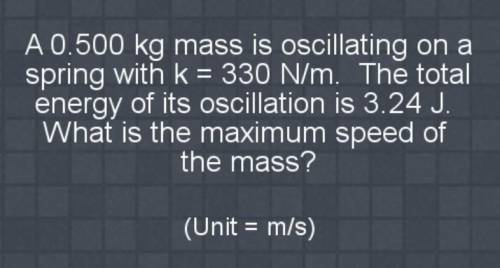A 0.500 kg mass is oscillating on a
spring with k = 330 N/m. The total
energy of its oscillati...

Physics, 06.06.2020 22:58 daisyperez1
A 0.500 kg mass is oscillating on a
spring with k = 330 N/m. The total
energy of its oscillation is 3.24 J. What is the maximum speed of
the mass?
thank you in advance for your help!


Answers: 1


Other questions on the subject: Physics

Physics, 22.06.2019 01:40, sasalinas2001
In all trials, the magnitude of the final velocity for g1 + g2 was less than the magnitude of any initial velocity. as mass increased, what happened to the velocity? the velocity decreased. the velocity increased. the velocity of g1 + g2 could not be measured. the velocity was not affected by the mass increase.
Answers: 1

Physics, 22.06.2019 11:40, johanperezpere51
Imagine that you have two balloons (or, better yet, actually inflate two balloons, if possible). create static electricity around one of the balloons by rubbing it against your hair or your sweater and then bring that balloon close to the other balloon, which has not been charged. try this with at least one other object—and for variety in the discussion, avoid using an object already described by your classmates. then, for your initial post to the discussion, answer the following questions: what happened with the two balloons?
Answers: 3


Physics, 22.06.2019 23:00, itscheesycheedar
Astronomers studying the planet of rhombus have detected sedimentary rock on its surface. one astronomer wonders if material in this sedimentary rock used to be in igneous rock deep in rhombus’s interior. can igneous rock become sedimentary rock? explain your answer.
Answers: 1
You know the right answer?
Questions in other subjects:

Social Studies, 17.07.2019 10:00

History, 17.07.2019 10:00





Chemistry, 17.07.2019 10:00


Physics, 17.07.2019 10:00




